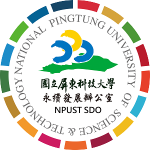Since 2019, our university’s Department of Forestry has collaborated with the Chingjing Lin Educational Foundation in promoting green initiatives. For the second consecutive year, nearly 1,500 tree saplings were planted at the Pingtung University of Science and Technology’s Bao Li Forest Station, moving from the Darensi Forest Station on November 12. The event, titled “Embark on Tree Planting,” was organized by a professional team from the Department of Forestry, led by Director Wang Chih-Chiang. Suitable climates and terrains were chosen, and environmentally beneficial seedlings such as the Hengchun Mountain loquat, hairy persimmon, Chinese hackberry, Japanese pagoda tree, peach blossom heartwood, maple, and large-leaved olive were planted to embody the spirit of “Rural Mountain Advocacy.” The event was attended by President Tai Chang-Hsien, Chairman Lin Tsung-Lin of the Chingjing Lin Educational Foundation, General Manager Su Tso-Cheng of the Agricultural Bank, Deputy General Manager Wu Pai-Jen, Dean Chen Ho-Hsien of the College of Agriculture, Director Chen Chien-Chang of the Department of Forestry, along with faculty and students from the department, and corporate partners from Chingjing Lin Educational Foundation. Over a hundred “Forest People,” spanning different age groups, including parents with young children, actively participated, physically planting trees with special significance for the future.
President Tai Chang-Hsien mentioned, “Nowadays, tree planting has become a visible practice. Due to climate change, we hope everyone can embrace the concept of energy conservation and carbon reduction. Through tree planting, we aim to regulate our climate correspondingly. Of course, the process should not be limited to tree planting; we also need subsequent forestry professionals to carefully care for the trees. Therefore, through the cultivation of relevant forestry capabilities, students can achieve a mindset of passing down traditions and sustainability. We hope to continue passing this knowledge to students who are making efforts to learn about and contribute to this land, helping to protect the beautiful treasure island of Taiwan together.” Chairman Lin Tsung-Lin of the Chingjing Lin Educational Foundation, speaking about his environmental promotion philosophy, said, “A livable city requires sustainable construction; a tree that has grown for 50 years requires the determination to take root. The impact of climate change is comprehensive, and the commitment to sustainable environments cannot stop. Since our team proposed that tree planting should not be just an activity but an idea that influences a group of people to eventually turn environmental protection consciousness into a way of life, no matter how many trees are planted now, the ultimate question is whether they can survive into the future. Thanks to several research professors from the Department of Forestry at Pingtung University of Science and Technology and our partners who have guided us. They have even thought about the sustainable planning for the next 5, 10 years, and beyond. We look forward to the future where our descendants can enjoy the trees that were planted today.” Director Chen Chien-Chang of the Department of Forestry at Pingtung University of Science and Technology stated, “Trees absorb carbon dioxide and store it in the form of organic carbon. With age, the amount of stored carbon increases. Taiwan has nearly 60% of its land area covered by forests. If properly and effectively managed to enhance tree growth, it can achieve the goal of carbon reduction. Thanks to the Chingjing Lin Educational Foundation and the Department of Forestry at Pingtung University of Science and Technology for jointly planting trees, leaving behind a continuous seed for sustainable forests.”
In addition to the goal of planting a thousand trees, this year’s event allowed participants to have a deeper natural experience through the “Five Senses of the Forest”: touching the land, listening to the sounds of nature, enjoying small farm cuisine, and even climbing large trees and experiencing forest breathing. This allowed people to take home phytoncides, practicing the ideal of harmonious coexistence between humans and nature. Furthermore, the Department of Forestry showcased the latest unmanned aerial vehicle during the event. In the future, geographic remote sensing technology will be used with a smart forestry management model to effectively investigate forest health. This not only enables the large-scale digitization of forest management but also aims to scientifically and conveniently care for the millions of tree saplings planted by the “Forest People,” protecting the environment and nourishing the earth.

















